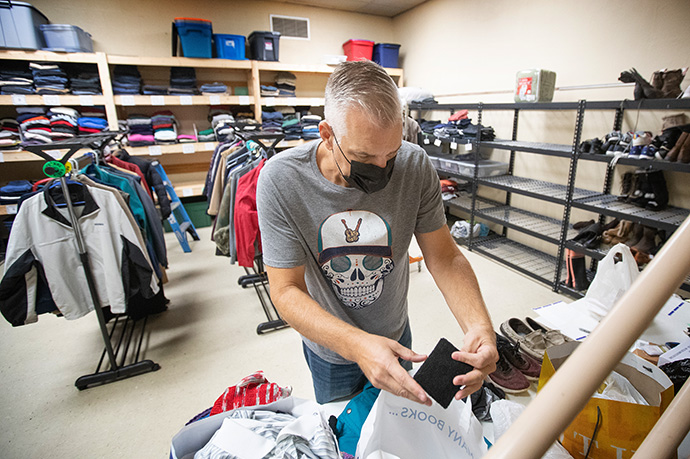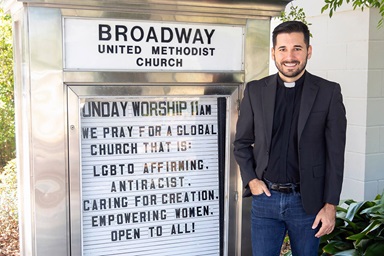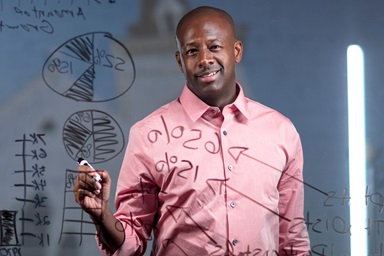Key Points:
- Mixed-use developments that replace or upgrade aging church properties might offer economic and spiritual answers for declining congregations.
- Unused space translates to an opportunity to do social good.
- Wesley Community Development, in North Carolina, specializes in helping churches making decisions about their property.
Jacques Brown was waiting at McKendree United Methodist Church in downtown Nashville, but not for a church service.
“I’m here to get help with some clothes and stuff,” Brown said. “I’m homeless right now, so I’m trying to get all the help I can get. Somebody told me about this program with this church right here, so that’s why I came over.”
Like many folks waiting to take their turn in McKendree’s Clothes Closet on Sept. 29, Brown had an air of weary resignation about him — but also a faint, defiant hope about his future.
Up until a couple of years ago, Brown, who grew up in a Nashville housing project, had worked his way up to managing a White Castle burger joint and had a wife and a home.
“I had everything, but me and my wife — you know how it goes — going through a divorce and stuff,” he said. “I go to other churches, too. They do showers, let you wash your clothes, help you with housing, identification and all that type of stuff.”

Although ministries like the Clothes Closet have been going on forever in churches, loss of members in recent times is leading church leaders to use thousands of square feet of otherwise wasted space to expand their reach further into the community. At the same time, McKendree is working to grow its membership by experimenting with smaller ministries that meet outside the church building in coffee shops and the like.
“When I got here in 2009, the third and fourth floors (of the church) were vacant,” said the Rev. Stephen Handy, pastor of McKendree. “Those were historically Sunday school classes. But as the congregation aged over time, those Sunday school classes went away.”
Handy and other church leaders decided that the space should be repurposed to serve the community. Some of that is being done by the church itself, while McKendree partners with other entities better prepared to offer other services.
“The prerequisite was it had to be nonprofit and it had to align with our mission of making disciples for the transformation of the world,” Handy said.
Today, McKendree uses church space to provide free haircuts, house and help 18- to -24-year-olds who have aged out of foster care, offer a temporary place to live for missionaries who serve in the city, feed people, provide medical and dental checks in collaboration with United Methodist-related Meharry Medical College and operate the Clothes Closet.
Monday through Friday, 90% of the McKendree church building’s 46,425 square feet is being utilized with some sort of ministry, Handy said.
“We’re just reclaiming our roots,” Handy said. “It’s part of our history that we had abandoned through wanting to be this upper middle-class church, when God has called us to be examples of Jesus to connect with the marginalized.
Subscribe to our
e-newsletter
“If you’ve got to be in a downtown urban center, you have to connect with the marginalized, and probably 20% of our congregation are marginalized people.”
At Norfolk United Methodist Church in Virginia, the Rev. Sherry Daniels says a membership of about 300 maintains a more than 16,000-square-foot church building.
“It’s not a burden. It is a challenge,” Daniels said. “But it is a part of the larger vision that we have for our ministry that we not just be a worshiping community that gathers on Sunday, but that we are in ministry seven days a week.”
The church uses its space to minister with teen mothers and has converted the parsonage into transitional housing that boards three homeless families. It also provides free space to four small businesses that COVID-19 nearly drove out of business.
“The commercial rates were really out of range for most small businesses — particularly minority-owned small businesses,” Daniels said. “So we repurposed our space so that we could accommodate those businesses that were in line with our vision and our values.”
The church also provides the businesses some office support and use of its commercial kitchen.
Wesley Community Development, in Huntersville, North Carolina, consults with congregations on repurposing or selling property with an eye toward sustainable ministry. The firm manages real estate for the Western North Carolina Conference and has done $160 million in development since 2019. It’s also done work in Virginia and Georgia.
“This is a faith-based but professional real estate firm that is really working hard to help churches reposition,” said Joel A. Gilland, Wesley’s senior vice president of strategic planning and the son of a United Methodist minister.
“The first thing is to always keep the church first,” he said. “If we’re dealing with a closed church, then the question is, ‘Can it be repurposed?’ If we’re dealing with an active church, how do we help them become more sustainable and continue to grow their ministry while removing the burden of real estate off of their shoulders?”
Membership rolls have been shrinking as congregations age and younger people either don’t join or contribute as much. This is taking a toll on churches, Gilland said.
“The buildings are becoming a hindrance; they’re becoming an obstacle to new growth,” he said.
Mixed development combining churches with affordable housing, businesses and other destinations is the blueprint to a sustainable church future, Gilland suggested.
“I think particularly the next five years are going to be very busy,” he said.
“I think we’ll probably be doing child care, mental health facilities, retail and office. It’s an interesting concept of putting the church in the center of the community instead of you drive into a parking lot, and the only place that goes is the church.”
It’s a positive development for there to be a Starbucks convenient to a church, or for concerts to be staged near or in the church itself, Gilland said.
“This is a really, really exciting time for the church,” he said. “I hear a lot of folks talking about the death of church. … I see this as a really exciting time to reconnect, reenergize and play a new role.”
Patterson is a UM News reporter in Nashville, Tennessee. Contact him at 615-742-5470 or [email protected]. To read more United Methodist news, subscribe to the free Daily or Weekly Digests.




